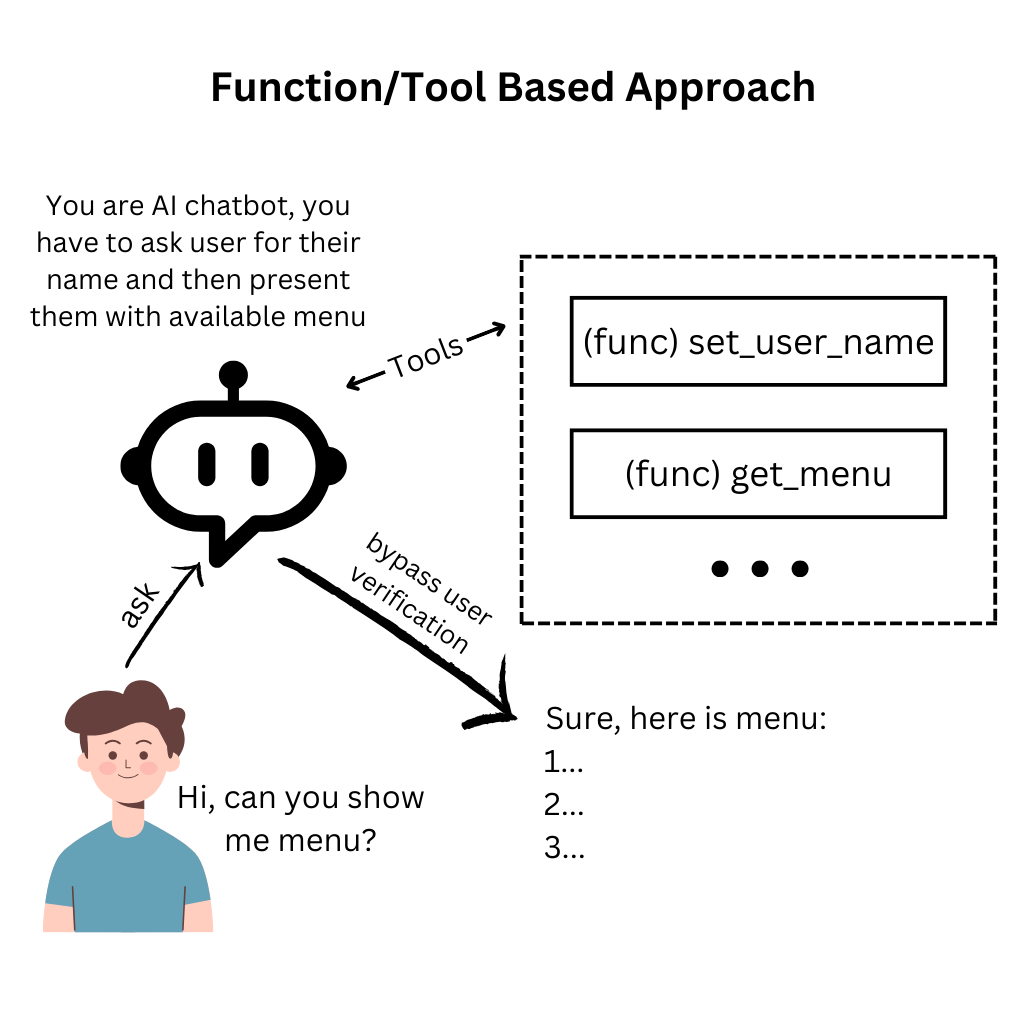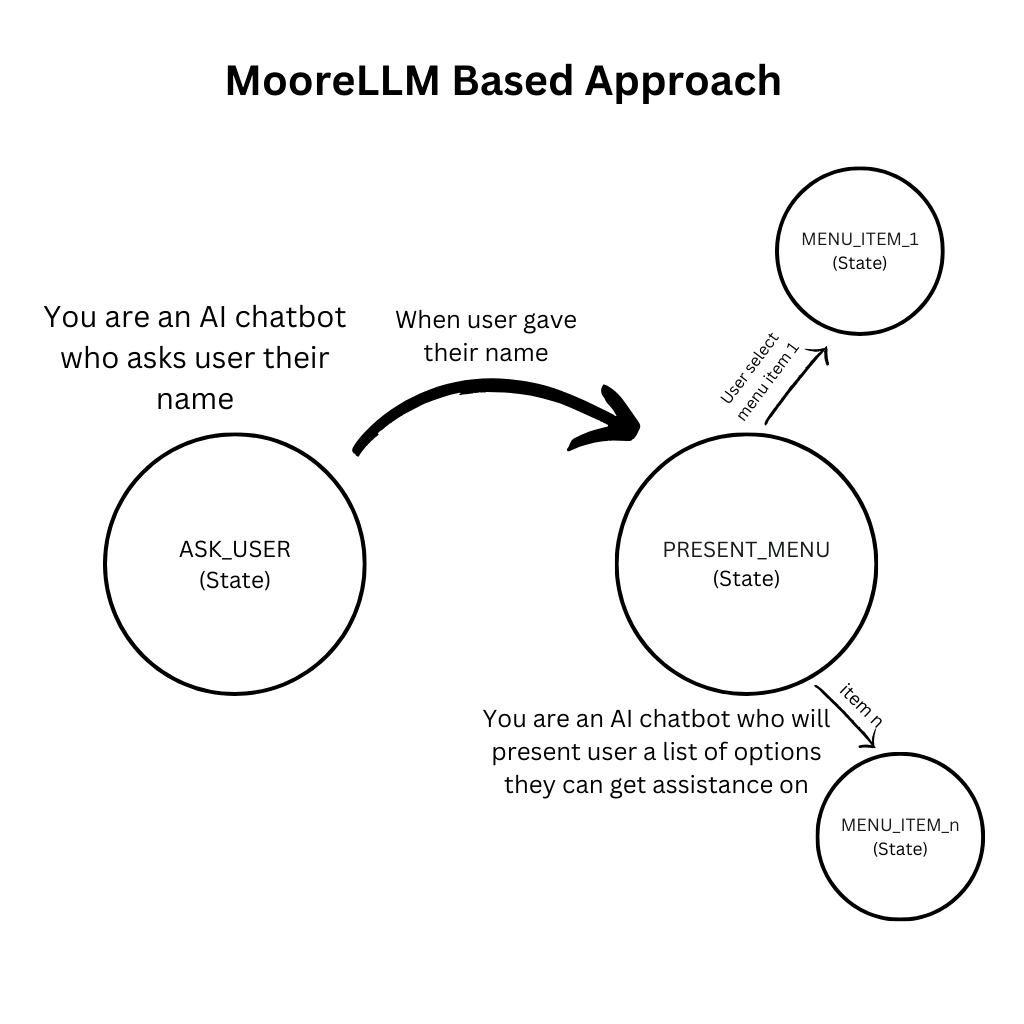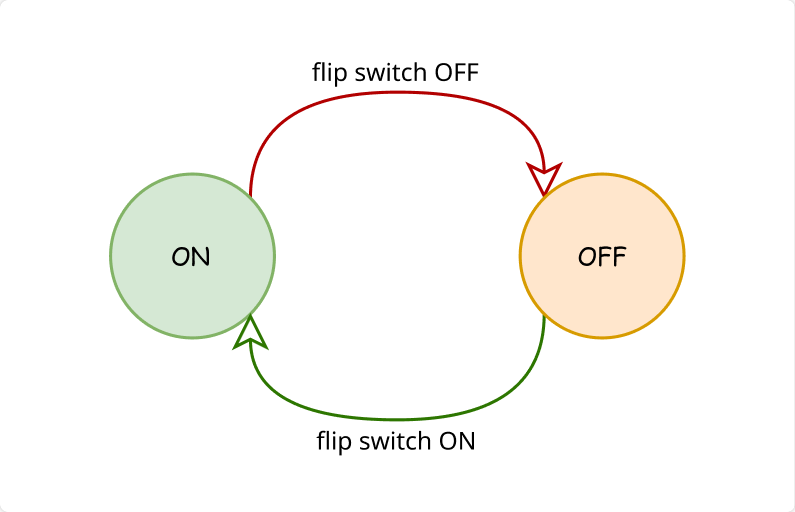Welcome to the MooreLLM project! This project is a FSM based approach for creating agentic applications..
The current approach (as i have observed) for creating LLM agents are simply giving prompts and some tools, which the LLM can use to generate the desired output. This approach is not very flexible as it may hallucinate or call wrong tools, MooreLLM is an attempt at creating a very controlled LLM agent which has set of states and transitions, and can only perform actions that are allowed in the current state.
For example, imagine a call-center chatbot, which will converse according to current state, ie if user has just started the chat, the bot will ask for the user's name, and then greet the user.. then only when user has provided the name, the bot will ask for the user's query.. and so on..
ie the conversation pattern will follow a specific flow, and the bot SHOULD NEVER ask for the query before the user has provided the name.
Now imagine a function based approach, where the bot can ask for the name, greet the user, and ask for the query, all at the same time.. this is not a very good approach as the bot can ask for the query even before the user has provided the name.. this can lead to a bad user experience and potentially uncontrolled behavior.
Current approach of mitigating such issues is instructing in system_prompt about the set order/sequence, but this is error prone and not very flexible.
Create states for each of the conversation steps, and transitions between them.. this way the bot can only ask for the query when the user has provided the name.. this is a very controlled approach and can lead to a better user experience.
ie now I will have seperate system_prompt for both greeting and asking for the query, so until I am in greet user state, I will only use the system_prompt for greeting, and once I have moved to ask_for_query state, I will only use the system_prompt for asking for the query.
It is an application that can act on its own, without the need for human intervention. It can make decisions, take actions, and interact with the environment.. for example
- A chatbot that can answer questions
- A robot that can perform tasks
- A game character that can play a game
A Finite State Machine (FSM) is a mathematical model of computation. It is a set of states, transitions, and actions. The machine can be in only one state at a time, and it can change from one state to another in response to some inputs. FSMs are widely used in many applications, such as games, control systems, and natural language processing.
To use MooreLLM, you need to define the states and transitions! Each state will have base system prompts, and transitions will have the conditions to move from one state to another, for each state you can even parse complex generated output or make use of context variables. (We will see this in the examples)
Install the moorellm package with pip
$ pip install moorellmOr install the latest package directly from github
$ pip install git+https://github.com/searchX/moorellmCreate FSM
import openai
from moorellm import MooreFSM
from moorellm.models import MooreRun
# Create the FSM
fsm = MooreFSM(initial_state="START")
LIGHT_STATE = "OFF" # Default stateDefine default state START
# Define the states
@fsm.state(
state_key="START",
system_prompt="You are AI light switcher, Ask user if they want to turn on the light.",
transitions={"STATE_ON": "If user says to turn on the light"},
)
async def start_state(fsm: MooreFSM, response: str, will_transition: bool):
global LIGHT_STATE
if will_transition and fsm.get_next_state() == "STATE_ON":
LIGHT_STATE = "ON"
print("LIGHT TURNED ON")
return responseDefine state STATE_ON
@fsm.state(
state_key="STATE_ON",
system_prompt="Turning on the light...",
transitions={"START": "If user says to turn off the light"},
)
async def state_on(fsm: MooreFSM, response: str, will_transition: bool):
global LIGHT_STATE
if will_transition and fsm.get_next_state() == "START":
LIGHT_STATE = "OFF"
print("LIGHT TURNED OFF")
return responseRun the FSM
async def main():
# Create the OpenAI client
openai_client = openai.AsyncOpenAI()
# Simulate conversation
while True:
user_input = input("You: ")
run_state: MooreRun = await fsm.run(openai_client, user_input=user_input)
print(f"AI: {run_state.response}")
print("CURRENT LIGHT STATE: ", LIGHT_STATE)
import asyncio
asyncio.run(main())States:
- START: The initial state where the AI asks the user if they want to turn on the light.
- STATE_ON: The state where the AI turns, only available transition at this state is to turn off the light.
Notice the transitions, for state start we defined only one transition to STATE_ON, and for state STATE_ON we defined only one transition to START, this way the AI can only move from start to STATE_ON and then from STATE_ON to start and not any other state.
Note: Default transitions are always available, so if the user input does not match any of the transitions, the AI will move to the same state (ie loop back).
import openai
from pydantic import BaseModel
from moorellm import MooreFSM
from moorellm.models import MooreRun
# Create the FSM
fsm = MooreFSM(initial_state="START", end_state="IDENTIFIED")
class UserIdentificationResponse(BaseModel):
content: str
user_name: str
phone_number: str@fsm.state(
state_key="START",
system_prompt="You are user identification bot, You have to identify the user by asking their name and phone number.",
response_model=UserIdentificationResponse,
transitions={"IDENTIFIED": "If user provides their name and phone number"},
)
async def start_state(
fsm: MooreFSM, response: UserIdentificationResponse, will_transition: bool
):
if will_transition and fsm.get_next_state() == "IDENTIFIED":
# Set into context
fsm.set_context_data(
"verified_user",
{
"user_name": response.user_name,
"phone_number": response.phone_number,
},
)
return "Thanks for Identifying yourself."
return response.contentCall it with
async def main():
# Create the OpenAI client
openai_client = openai.AsyncOpenAI()
# Simulate conversation
while fsm.is_completed() is False:
user_input = input("You: ")
run_state: MooreRun = await fsm.run(openai_client, user_input=user_input)
print(f"AI: {run_state.response}")
# Get the context data
context_data = fsm.get_context_data("verified_user")
print(f"User Identified: {context_data}")Sample Output
You: Hi
AI: Hello there! Could you please provide your name and phone number so I can identify you?
You: My name is Harishankar
AI: Thanks for providing your name. Could you please provide your phone number?
You: My phone number is 1234567890
AI: Thanks for Identifying yourself.
User Identified: {'user_name': 'Harishankar', 'phone_number': '1234567890'}More examples can be found in the examples directory.
The full documentation can be found here
- The MooreLLM is a very basic implementation, and can be extended to support more complex use-cases.
- The FSM is designed to be used with OpenAI's GPT-4o+ (as it uses structured responses), but can be used with any other model as well (with some modification).
- Possibility of bad return json is non-existent, this is because we are using the latest structured responses from OpenAI, and the MooreLLM is designed to handle only structured responses.
MooreLLM at its current state is a very basic implementation, and very opinionated.. I would love to see more contributions and ideas on how to make it more flexible and useful for a wider range of applications, any PRs are welcome!# moorellm


